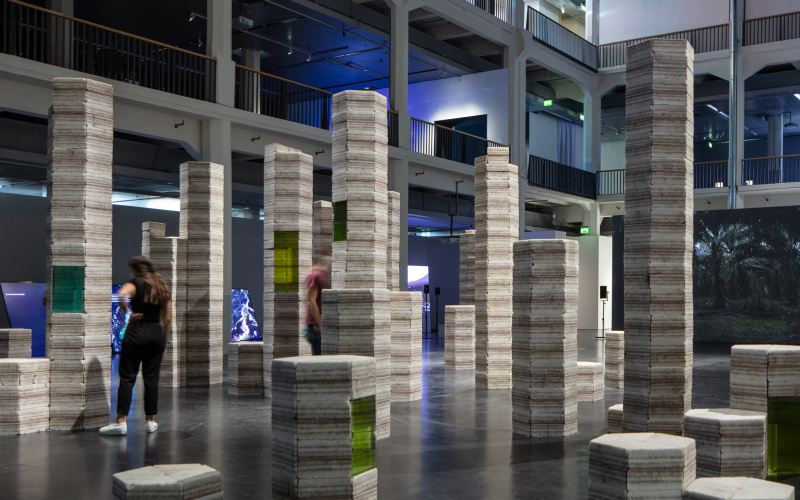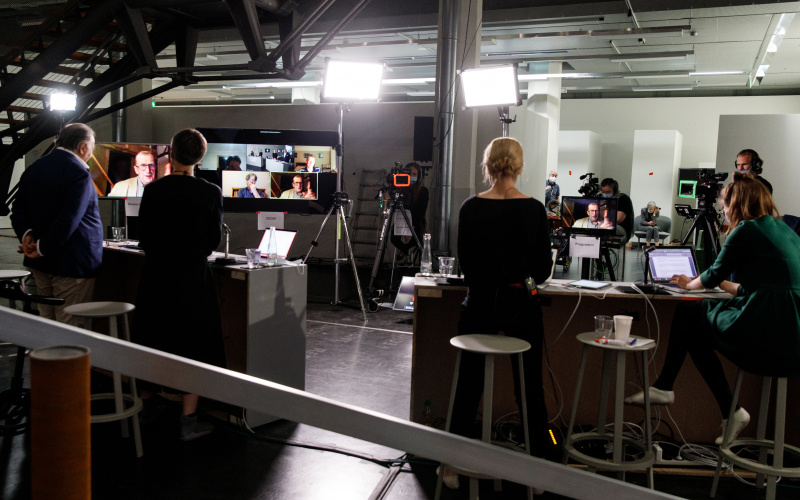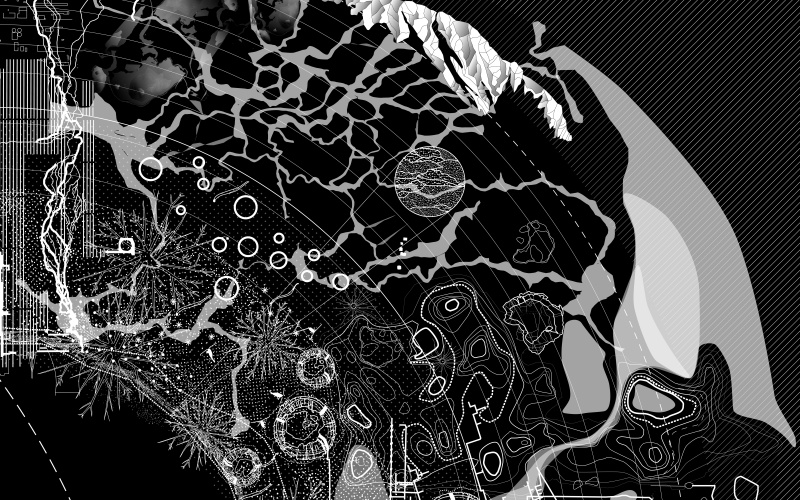Virus, Virality, Virtuality
Or: The Corona Virus, the Leviathan of the Proxy-Society – an Essay by Peter Weibel
The closed society to which we are condemned opens our minds. It let us understand that our systems are more fragile than we ever thought. The first tele-society in human history is just emerging. Mass mobility is coming to an end. Globalization is running out of air. And: The telecommunication society is becoming a reality.
The play of the hour is by Jean-Paul Sartre and was premiered in 1944 under the title »Huis clos«. Three people are in hell after their death. You have curfew, that’s torture. They are locked together in a small room that they cannot leave and are constantly exposed to the eyes of the others. The famous message of the play is therefore: »Hell is other people.« – hell are the others.
Today the others are the infected ones. They are the heralds of hell, sickness, and death. They are the ones we are supposed to protect ourselves from and we have to refrain from.
Sartre’s drama today would be entitled »Shutdown« because all of Europe is in the mode of shutdown. In New York, because of the order to stay at home, there is »shelter in place«. The word »shelter« means bunker. The German word »wohnhaft« [resident] reveals its real meaning in the corona crisis, namely being in »Haft« [custody] in your own »Wohnung« [apartment]. The infected ones become interned and detained in solitary confinement.
Staying in your own apartment (in a separate single room, Italian »appartare«, ‘to set apart’) means, à part, to be on the edge, to be outside, to be excluded. What a paradox of being excluded from public and social life by being trapped in our homes, house and yard. We live in closed rooms, locked up in a closed society – like after death, just under curfew.
The system is fragile
But it is also the hour of media theory. From William S. Burroughs to Jean Baudrillard, theorists tried to grasp the effectiveness of the mass media using virological metaphors years ago. Burroughs even claims that »Language is a virus from outer space«, that is language, the first communication medium, is a virus. In numerous essays on virality, video world and virulence, Baudrillard never tired of characterizing the spread of information as contagious and warning of these viral mass media.
Had the rulers observed system theories, they would have known that the more complex a system is, the more fragile it becomes. Chaos theory suggests that the flap of a butterfly’s wing in Brazil can trigger a tornado in Texas (Edward Lorenz, 1961). One or two infected people in the metropolis of Wuhan trigger a pandemic across the globe. Minimal deviations from initial conditions can indirectly lead to a catastrophe of the system, even to a collapse. This is exactly how viruses work, from computer viruses to biological viruses with their system-destabilizing effects. They attack both the genetic and the informational code. Because they are hyper-functional, they spread rapidly in the accelerated circulations of global systems and create catastrophes. Metaphorically speaking and turned positively, the virus makes the gaps and the defects of a system visible. As William S. Burroughs wrote, the drug needle pierces into a gap.
The gaps range from defective democracies to defective transport and health systems, and there are delays, misconduct, failure. The health care system was literally doomed to death by privatization and austerity politics from too few staff and beds, too little salaries.
Modest 23,000 intensive care beds are available for 80 million Germans. Now this system actually produces dead people. The virus must be defeated as quickly and brutally as possible, not only for the sake of the sick, but also to cover up the failure of economic and political regimes, which despite all signals, from the recurring financial and migration crises to the care and climate crisis, could be obscured for decades. That is the dangerous potential of the virus. This is his system subversion, which can lead to a complete shutdown of the system. The virus reveals a system crisis. It is not an external occupation, no, it is an inherent systemic effect.
The media are also viral
The first infodemic is being identified on social networks, because now a real virus meets the virality of the media. The media amplifies the effects of the real virus exponentially because they form an echo space, a resonance space that multiplies the effects of the virus.
The virus spreads at lightning speed, but reports about the virus spread just as rapidly. The virtual almost exponential growth of the effects of the virus in the mass media corresponds to the real exponential growth of the virus. Every single infected or dead person is extrapolated every day. We receive reports that CDU candidate for chancellor Friedrich Merz or US actor Tom Hanks and his wife are infected.
If we were to do the same for every flu disease, the communication highways would not be wide enough to spread the information about hourly illnesses and deaths. If we were to report flu cases as frequently as the corona cases, there would be a panic that could be as dangerous as the virus itself. The pandemic is intensified to panic in the media. If the numbers are correct, there are 500 million people suffering from flu worldwide every year. Of these, between 290,000 and 650,000 people are said to die each year from the effects of the flu. For comparison: The virus that causes Covid-19 results in more than 10,000 deaths (as of today) worldwide.
The further development of the pandemic cannot be predicted with definite certainty. We do not know whether the situation is bad enough, whether it will get worse or whether it will be less bad. Therefore, at the moment we can only deal with the time after the crisis and inquire into the deeper causes, symptoms and problems of this corona crisis.
Excessive, extensive space and time-covering media reports can unleash a storm over Europe in the media. Entire cities, nations, continents are then infected, interned, forcibly isolated and imprisoned. The state of emergency, like a curfew, becomes a normal state because fear keeps the population in check or imprisoned.
In another drama by Sartre, »The Flies« (»Les Mouches«, 1943), Oreste ends the horror regime of the murderer Egisthe, who ruled with the means of fear, which is symbolized by the plague of flies. Oreste removes the plague of flies and frees people from fear because power is based on people not knowing that they are actually free. Therefore, the government reigns by fear; phobocracy and plagues have been an effective instrument of ruling since Egyptian days. The virus seems to be like the plague of flies, an invisible occupation, comparable to a military occupation. Therefore, president Macron of France says: »We are at war.« But what war? – the war of the state against its own citizens or the war of mankind against nature or the war of nature against human beings? But the virus is a monster that destroys our social and financial system from within. It is a monster like Leviathan in the book »Leviathan« (1651) by Thomas Hobbes that teaches people fear as basis for governing.
Mass mobility is over
In my writings of the 1980s – »Die Beschleunigung der Bilder« [The Acceleration of Images] (1987) and »Vom Verschwinden der Ferne« [From the Disappearance of Distance] (1990) and – I put forward the thesis that the 19th century not only produced the industrial revolution, but also its crucial telecommunications. The industrial revolution was machine-based and based on wheel technology. Rolling wheels (trains, cars, bicycles, airplanes) have accelerated the mobility of bodies and goods. This massive material mobility led humanity to fatal strategies.
The highways are obviously dead ends, stretched of standstill. Mass transport and tourism by train, plane and car have wreaked havoc on the landscapes and contaminated the seas. The etymological relationship between the gigantic cruise ships, the floating cities, and the cruise missiles has been overlooked.
These ships are missiles. The holiday industry is nothing more than a war against nature. Now nature in the form of a virus is forcing us to end this war, to stop excessive mass mobility, at least temporarily. Airplanes remain on the ground, ships in the harbor, hotels and shops are closed, people are closed in at home. The globalization balloon runs out of air.
The society of proximity is coming to an end
For the post-industrial media-based revolution, which is crucial for the 21st century, the separation of messenger and message is decisive. Until the invention of telegraphy, fax and telephone, a message could only be brought and transmitted with the help of a messenger, more precisely with the body of a messenger.
Be it Pheidippides, the Athenian marathon runner from 490 BC, be it a pigeon, a horse, a rider, a carriage, an airplane, a railway, it always took a messenger to deliver a message. With the telegram and the Morse code, strings and messages could be transmitted disembodied for the first time.
The body of the transmitter stayed in place, the message was transmitted by cable, and the receiver in the other place was able to process the information. This cable-like telecommunication (telegraphy, telephony, fax) was, after the discovery of electromagnetic waves, converted into wireless telecommunication (radio, television) in the 20th century, into an infosphere wrapping the globe.
The moment messages could travel alone, a body-based society of proximity (Latin proximus, ‘very near, close by’) turned into a tele-society. Every technology, whether car or telephone, is used to overcome distance (Greek tele-). We have been living in a telecommunications society for more than a hundred years, but the world has not yet acknowledged this change.
Atavistic tribal rituals of the proxy-society exist parallel to the virtual tele-society. Material mobility of bodies and machines exists parallel to the immaterial mobility of signals and media. This makes our society look like the automobiles of the turn of the century, the design of which resembled horse-drawn vehicles. In the beginning, the designers did not understand that the cars drive themselves and still thought of the messenger’s body, the horse, and consequently built the car like a carriage.
Something similar is happening today and provides the basics of the pandemic, the risk of contagion for everyone, as the Greek pan- (‘all’) says. People, local collectives, hordes and herds graze on beaches, meadows and grass in Stadiums to attend a rock concert or a football game. However, the games and concerts do not basically serve the local mass audience, but rather the non-local masses, the virtual audience, which sits decentrally in front of TV sets and tablets worldwide. The local masses in the stadium serve as a picturesque scenery for the non-local, virtual society at home. The broadcasting companies pay for the sport events, they create a local public to entertain a non-local public in front of the TV screens.
Guests talk to the moderator in talk shows for the virtual non-local TV audience, but they need a group of local claqueurs as staffing. These agglutinations, clumping of bodies in local mass society, from stadium entertainment to beach vacations, are obsolete rituals of proxy-society and possible sources of the pandemic. That’s why we recently played in front of empty concert halls and in empty stadiums. From football games to rock concerts, the local mass audience is finally being removed, which has long been redundant. The music and sports industries earn money with the non-local virtual, not with the local mass audience.
It now seems that the gigantic stadiums and opera houses are the pharaoh tombs of the future. Exaggerated bizarre architectural signatures, already created in the awareness of the death of the entertainment forms of the proxy-society, will soon prove to be superfluous. If they remain without an audience, if there are only ghost games in stadiums and concert halls, one will wonder why one actually needs such gigantic empty venues.
The new era has begun
So it can be said that one of the lessons of the virus is to push us into the digital age. No forms of production and no forms of reception will remain unaffected. The constant calls »Do not touch! Keep your distance! Avoid proximity!« means the end of proxy-society and nothing less than that all social forms are affected by the virus. The constant call »Do not come closer!« adorns the entrance portal to the tele-society in a prognostic way.
In the 1980s we already developed with the personal computer and in the 1990s with the Internet those technologies that will enable the life of the non-local masses in virtual online-worlds. All online services, from ordering goods to health checks, have already shown ways of avoiding physical contact.
You no longer have to go to the cinema to watch films, you can stream them at home. You no longer go to bookstores to buy books, but have them delivered to you by mail. There is e-commerce and e-banking – everything virtual, non-local, disembodied communication and transaction.
The locally bound mass audience in real physical space becomes a gathering of individuals in the nonlocal, decentralized, distributed Virtual space of teletechnology, and agglutination becomes an association. Excessive material mobility, which is harmful to nature and thus also harmful to humans, becomes intangible Virtual mobility after the Separation of messenger and message. The flow of traffic becomes the flow of signs. We drive, drive, drive not only on the highway, but send Signals on the electronic highway.
Culture becomes an online paradise. Due to its virality, the virus forces culture to migrate into Virtual worlds – an important Step for increasing the power of abstraction and symbolization in humans, that is, for evolution.
With the worldwide spread of the corona virus, we are experiencing how the globalization balloon runs out of air, because all wheels stand still – not because of the strong arm of the workers, as Georg Herwegh still claimed in a hymn in 1863, but a virus brings everything to a standstill. This virus forces us to reassess the silence – and to say goodbye to the noise or emissions that we have been producing in ever greater quantities for 200 years.
In this break we have the opportunity for fundamental reforms of our economic, social and cultural Systems. What previously seemed impossible is now inevitable. Our world will be different.
This text was fist published in German in the »Neue Züricher Zeitung« on March 20, 2020.



